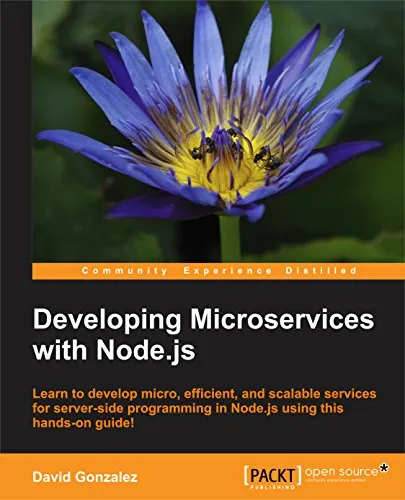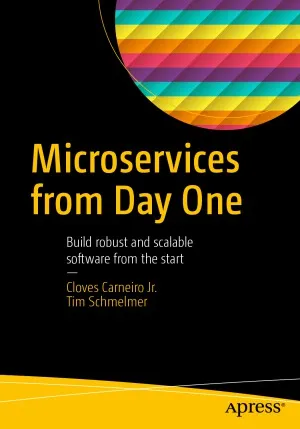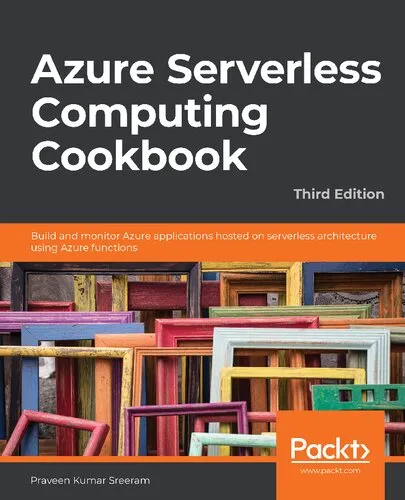Microservices Flexible Software Architecture
4.5
بر اساس نظر کاربران

شما میتونید سوالاتتون در باره کتاب رو از هوش مصنوعیش بعد از ورود بپرسید
هر دانلود یا پرسش از هوش مصنوعی 2 امتیاز لازم دارد، برای بدست آوردن امتیاز رایگان، به صفحه ی راهنمای امتیازات سر بزنید و یک سری کار ارزشمند انجام بدینکتاب های مرتبط:
مقدمهای بر کتاب
کتاب Microservices: Flexible Software Architecture نوشته ابرهارد وولف، یکی از منابع معتبر و مهم در حوزه توسعه نرمافزار به روش Microservices است که به توسعهدهندگان و مهندسان نرمافزار کمک میکند تا با روشهای نوین و موثر، سیستمهای نرمافزاری پیچیده و قابل انطباق بسازند.
خلاصه تفصیلی کتاب
این کتاب با ارائه یک دید کلی درباره اصول و مبانی Microservices، به بررسی مزایا و چالشهای این معماری میپردازد. هدف نویسنده این است که خوانندگان بتوانند درک کاملی از چگونگی پیادهسازی و مدیریت سیستمهای Microservices پیدا کنند. در ابتدا، مفاهیم اصلی معرفی میشوند و سپس به چگونگی شکستن سیستمها به سرویسهای کوچک و مستقل پرداخته میشود. نویسنده همچنین به موضوعات مهمی مانند Continuous Delivery، DevOps و مدیریت دادهها در سیستمهای توزیع شده میپردازد.
نکات کلیدی
- فهم معماری Microservices و نحوه طراحی سیستمهای نرمافزاری انعطافپذیر.
- استفاده از Continuous Integration و Continuous Delivery برای بهبود فرآیند توسعه.
- چالشهای مرتبط با پیادهسازی و مدیریت سیستمهای توزیع شده را بشناسید.
- تکنیکهای موثر برای مدیریت دادهها و پایگاههای داده در معماری Microservices.
جملات معروف از کتاب
"Microservices allows you to deploy software faster and more reliably, leading to improved business agility."
"A successful Microservices architecture is all about managing the complexities that come from decomposition of your system."
"The key to effective software architecture is not just technical design but understanding the organization and business context."
چرا این کتاب مهم است؟
این کتاب نه تنها به عنوان یک راهنمای جامع برای طراحان و مهندسان نرمافزار خدمت میکند، بلکه به عنوان یک منبع آموزشی ارزشمند برای کسانی است که میخواهند سیستمهای فعلی خود را به مدلهای Microservices ارتقاء دهند یا سیستمهای جدیدی با این معماری طراحی کنند. نویسنده با تجارب فراوان در این حوزه، دیدگاههای عملی و کاربردی را ارائه میدهد که میتواند به تسهیل و تسریع فرآیند گذار به معماری Microservices کمک کند. این کتاب به خوانندگان فرصت میدهد نگاهی عمیق به چالشها و فرصتهای موجود در معماریهای نرمافزاری مدرن داشته باشند.
Introduction to 'Microservices: Flexible Software Architecture'
Microservices have taken the software development world by storm, offering a unique approach that promises to streamline processes, increase agility, and allow businesses to scale and evolve like never before. In 'Microservices: Flexible Software Architecture', Eberhard Wolff demystifies this cutting-edge organizational framework, providing invaluable insights into its application, benefits, and challenges. This book is not just a guide but a comprehensive roadmap to understanding and leveraging microservices architecture to its fullest potential.
A Detailed Summary of the Book
In 'Microservices: Flexible Software Architecture', Eberhard Wolff delves into the world of microservices, offering readers a detailed narrative on how these small, independently deployable services can create a cohesive software architecture. The book begins by explaining the fundamental concepts of microservices, comparing them to the traditional monolithic architectural style, and highlighting their advantages, such as scalability and flexibility. Wolff guides readers through the strategic implementation of microservices within an organization, addressing considerations like communication patterns, infrastructure automation, and continuous delivery practices.
Real-life examples and case studies are woven throughout the text, demonstrating how companies have successfully—or unsuccessfully—adopted microservices. This practical approach helps readers understand the real-world implications of the theoretical concepts discussed. The book also provides insights into modern technologies and tools that support microservices architecture, including containerization technologies like Docker and orchestration tools such as Kubernetes.
Key Takeaways
- Understand the core principles of microservices architecture and how it differs from traditional monolithic approaches.
- Learn how to effectively decompose an application into microservices to enhance flexibility and scalability.
- Explore the role of DevOps practices in the successful implementation and operation of microservices.
- Gain insight into the essential infrastructure components required to support a microservices ecosystem.
- Discover strategies for overcoming common challenges associated with service orchestration, data management, and inter-service communication.
Famous Quotes from the Book
"Microservices are about making applications flexible so that they can be changed faster and scaled more effectively."
"The fundamental attribute of microservices is their ability to be deployed independently, enabling organizations to adapt to change rapidly."
Why This Book Matters
'Microservices: Flexible Software Architecture' is paramount for any organization or individual striving to comprehend and implement one of the most pivotal technological advancements in contemporary software development. Eberhard Wolff's approach is both comprehensive and accessible, which means that whether you are an industry veteran or a newcomer to software architecture, this book serves as an indispensable resource. Its critical perspectives on scaling, transforming, and sustainably growing a business in today’s fast-paced digital environment make it vital reading for anyone looking to harness the power of microservices.
Moreover, the book’s inclusion of practical examples, coupled with the theoretical groundwork, ensures that readers are not only informed but also prepared to put these strategies into practice. This ability to blend theory with practice is one reason why 'Microservices: Flexible Software Architecture' remains a definitive guide and a highly respected source in the field.
دانلود رایگان مستقیم
شما میتونید سوالاتتون در باره کتاب رو از هوش مصنوعیش بعد از ورود بپرسید
دسترسی به کتابها از طریق پلتفرمهای قانونی و کتابخانههای عمومی نه تنها از حقوق نویسندگان و ناشران حمایت میکند، بلکه به پایداری فرهنگ کتابخوانی نیز کمک میرساند. پیش از دانلود، لحظهای به بررسی این گزینهها فکر کنید.
این کتاب رو در پلتفرم های دیگه ببینید
WorldCat به شما کمک میکنه تا کتاب ها رو در کتابخانه های سراسر دنیا پیدا کنید
امتیازها، نظرات تخصصی و صحبت ها درباره کتاب را در Goodreads ببینید
کتابهای کمیاب یا دست دوم را در AbeBooks پیدا کنید و بخرید
1539
بازدید4.5
امتیاز0
نظر98%
رضایتنظرات:
4.5
بر اساس 0 نظر کاربران
Questions & Answers
Ask questions about this book or help others by answering
No questions yet. Be the first to ask!















